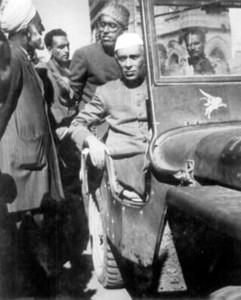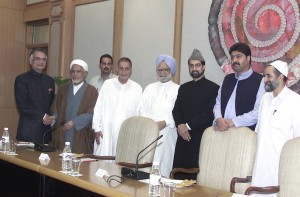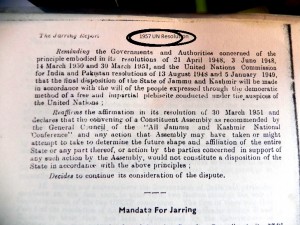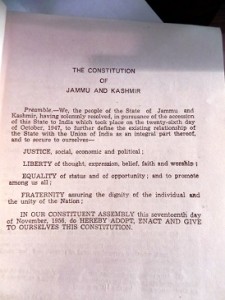Peace Watch » Editor's Take » Kashmir Elections An Engima?
Kashmir Elections An Engima?
Punchline
Post-Poll Discourses
Z. G. Muhammad
It has been a masterstroke. Conjuring the discourses during the 2002 elections de-linking the electoral process from the main political narrative of the state has been job of a master strategist. Mantra of Bijli, Sadak and Pani blended with façade of “soft-separatism” worked a laser beam that not only sliced the Hurriyat but almost subdued and muffled its political discourses. Ironically, some of the leaders and activist were caught up in ‘Hamlet’s syndrome.’ 
Having learned lessons from the 1996 Assembly elections. That were overwhelmingly boycotted. And despite best efforts made by New Delhi these were seen internationally as a grand military exercise- story of coercion and manipulations. Giving the 2002 elections some credibility internationally was the task. The new mantra worked like a magic wand, it attracted a good number of rural electorate towards the polling booths. And after the 2002 elections, the mantra was so beautifully choreographed that it not only gained more currency and strength during the 2008 Assembly elections but also took the rural electorate by a storm during the Panchayat election. Looking forward for construction of a metalled road, a culvert and a job the rural populace voted in hordes.
The twelve year old mantra of Bijli, Sadak and Pani almost took a backseat during the 2014 Assembly election campaign. Instead, discourses regarding safeguarding the Article 370 and preserving the 1927 State Subject Law and offsetting the BJP plans for abrogating these laws dominated were at high pitch. Except some dissenting voices that were jailed, the Hurriyat leadership issued some ritualistic boycott calls but largely disconnected itself with the Assembly elections and preferred remaining engaged in flood relief works.
Nevertheless, this election renewed the debate that if elections for the State Assembly could be delinked from to use softer phrase from ‘larger political issue.’ In justifying delinking of the Assembly elections from the main political narrative some friends in academia and media taking refuge under UN resolutions kick-started another debate. -Their belief is that 30 March 1951 and 24 January 1957 resolution adopted by the Security Council do not bind the Assembly elections to the Dispute.
In the past Monday column, talking about genesis of these resolution, I said these resolutions were prompted by the General Council of the “All Jammu and Kashmir National Conference” adopting a resolution on 27 October, 1950, recommending the convening of a Constituent Assembly for the purpose of determining the “future shape and affiliations of the State of Jammu and Kashmir” with India. ‘This resolution was passed at the behest of GOI’ to subvert the process initiated by the Security Council for conducting an impartial plebiscite.
For understanding, if above mentioned UN resolution do provide for holding of Assembly elections in the state for local governance in right perspective, it would be interesting to known what frustrated the National Conference and worried New Delhi. And why, it wanted to rush with setting up of the Constituent Assembly.
‘Towards end of 1948, the UNCIP had sent a proposal to India and Pakistan governments. The main highlights of the proposal were: ‘that an impartial plebiscite would be held for deciding the accession of the state of Jammu and Kashmir, the Secretary General of the United Nation would nominate a person as Plebiscite Administrator for conducting of free and impartial plebiscite. He would derive from the Government of Jammu and Kashmir the powers which it considers necessary to conduct free and impartial plebiscite. All human and political rights should be re-established and guaranteed. The return of refugees should arranged by two Commissions to be nominated by India and Pakistan. The question of final disposal of the armed forces in the State of Jammu and Kashmir should be solved by the Plebiscite Administrator….’ India and Pakistan accepted the proposal and on 5 January 1949 a formal resolution embodying the proposal was adopted by the United Nation. 
In this dispensation there no role left for Sheikh Abdullah in holding a plebiscite -the role that Nehru had looked for him. All important powers had been vested in the Plebiscite Administrator. The idea of the Constituent Assembly was to defeat the 5 January 1949 UN resolutions. So UN adopted the Resolution No 91 rejecting the any action taken by the Constituent Assembly regarding disposition of the state. Notwithstanding, B.N. Rao assuring UNSC that the decision of the Assembly will not bind GOI, Jammu and Kashmir Constituent Assembly was created and on 7 November 1956 it adopted the Constitution. In the very preamble ‘it declared state of Jammu and Kashmir as integral part of the Union of India’. Article 3 of the Constitution reaffirms it, “The State of Jammu and Kashmir is and shall be an integral part of Union of India. It has been by virtue of the same Constitution that the State Legislature has come into existence and draws all powers from the same. This very document has laid down procedures for it and vests all powers in the Council of Minister. It would be naïve to believe that the Legislative Assembly can be delinked from the preamble of the Constitution, and in fact all institution created under this Constitution are subservient to the Article three. The UN resolution of 24 January 1957, has not accepted the very preamble of the Constitution. So it sounds naïve to construe the resolution rejecting some not recognizing the foundation of the Constitution and approving other provisions.
Leaving discussion on finer details about validity of elections vis-à-vis 1957 Resolution to the Constitution wizards. It is historical reality that media and political leadership in India has been projecting every election held in the state as reconfirmation of the accession of the state with Union of India. Nonetheless, international community does not look at these election through same lens but from a different prism. In the thick of debates on elections when anchors and panellists on television channels were saying Kashmiris have voted for democratic India and rejected “separatism”, UN Secretary Ban Ki Moon impressed upon India and Pakistan to serve security interests of their counties and of the region they must resume discussion and arrive an agreement on Kashmir and engage Kashmiris in the process and their rights must be respected at all times’.
Filed under: Editor's Take · Tags: Election 2014 Kashmir, omar abdullah, Z.G. Mihammad








your tone from the first sentence to the last but one paragraph is but ironic tryng to ridicule first those who delinked elections from the larger issue of future political determination of the state which you mockingly ascribe to others as having said 'larger political issue' as a softer option to political dispute. YOUR WHOLE PURPOSE OF WRITING THIS PIECE HAS BEEN TO PROVE ME WRONG 'IN TAKING REFUGE IN UN RESOLUTION OF 1957 FOR DELINKING ELECTIONS FROM THE POLITICAL DISPUTE.' IN SHORT YOU ARE TRYING TO SAY THAT THAT SINCE THE CONSTITUTION IS ENABLING THE ELECTION PROCESS WHOSE ARTICLE 3 DEFINES KASHMIR AS AN INTEGRAL PART OF INDIA., THEREFORE DELINKING ELECTIONS FROM THE LARGER POITICAL ISSUE IS NAIVEITY . BE THAT AS IT MAY, UN HAS NOT REJECTED IN EFFECT THE POLITICAL PROCESS FOR PUTTING AN ADHOC GOVT IN PLACE FOR DAY TO DAY GOVERNANCE OF THE STATE AND HAS ONLY SAID THAT IT REJECTS ARTICLE THREE OF THE CONSTITUTION BUT SEES THE NECESSITY OF HAVING ELECTIONS TILL THE MATTER IS RESOLVED BY PEOPLE THROUGH DETERMINING THE POLITICAL FUTURE OF THE STATE. here is where you are mixing the registers as your sole purpose in wrtring this was to prove i am wrong but by so doing you have only strengthened the dominant narrative and tried to weaken the kashmiris 'narrative which you always boast you are building on . your priority should have been to strengthen what i said rather than in trying to win a point over me only justify Delhi's discourse.